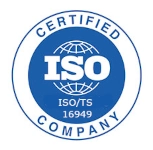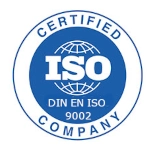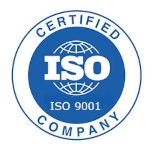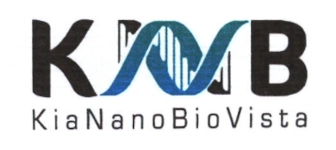Silicone Rubber Testing &
Laboratory Services

Wire Iran proudly stands as the first company in Iran to achieve ISO 17025 certification, highlighting our dedication to precision and excellence in laboratory testing. Since February 2002, our specialized laboratory for automotive ignition cables and polymer materials has driven advancements through collaboration with the National Standard Institute on research, testing, and product development.
 ISO/TS 16949
ISO/TS 16949
 ISO 9002
ISO 9002
 ISO 3808
ISO 3808
 ISO 9001
ISO 9001
 ISIRI 4267-2
ISIRI 4267-2
 ISO 17025
ISO 17025
 10993-5
10993-5
 10993-10
10993-10
 10993-4
10993-4
 Pharma
Pharma
 ASTM F756
ASTM F756
Wire Iran Laboratory -
Industry-Leading Lab for Silicone Product Testing
Equipped with advanced instrumentation and staffed by experienced professionals, our laboratory services adheres to international standards (ISO, DIN, JIS) to provide accurate, reliable, and repeatable testing for all silicone materials, including LSR, HTV, and specialty grades.




Services Overview
Our testing services covers mechanical, thermal, electrical, and environmental properties, ensuring each silicone material — from medical and food-grade LSR to industrial and consumer applications — meets stringent performance, compliance, and reliability standards before production.
Testing Criteria
| Category | Key Tests |
|---|---|
| Mechanical | Tensile strength · Elongation · Tear resistance · Shore hardness (A/D) · Rheometry (ML/ΔT) · Thermal shock |
| Electrical | Dielectric strength · Insulation resistance · Capacitance · Corona & tracking resistance (HV) |
| Thermal / Chemical | Heat aging · Thermal stability (TGA/DSC) · Oil/solvent immersion · Chemical resistance · Low-temp flexibility |
| Environmental | Salt spray · Weathering (UV/ozone) · Flame resistance (UL94 / FMVSS) · Humidity cycling |
Automotive components are subjected to flame resistance, thermal cycling, high-voltage insulation, megger, erosion, and salt spray testing, while silicone materials and molded or extruded products are evaluated for tensile strength, elongation, rheology, hardness, thermal shock, and insulation properties.
In collaboration with the National Standard Institute since 2002, all products are validated for consistent performance and durability under defined automotive and industrial operating conditions.
Tensile Test
High Voltage test
Uniformity Test
Quality Assurance & Certified Validation
At Wire Iran quality control is embeded in every stage of production. Our quality framework integrates real-time inspection and post-production testing. Samples are evaluated for hardness, elongation, tensile strength, and curing uniformity, while random sampling safeguards dimensional and process stability.
This traceability framework enables engineers, auditors, and OEMs to confirm compliance across automotive, medical, industrial, and food-contact applications. By combining accredited validation, traceable records, and strict process monitoring, our quality assurance consistently meet global performance, safety, and regulatory requirements.
Raw Material Testing
Samples are extracted and analyzed for hardness, elongation, and tensile strength. Approved batches receive a unique quality code before full-scale production.
In-Process Monitoring
Random sampling and real-time testing at critical checkpoints maintain stability, detect anomalies early, and minimize waste.
Final Inspection
Post-production evaluations confirm that every product meets both internal benchmarks and international standards.
Detailed reports, complete with performance graphs that outline temperature and curing time measures, ensuring that the final products deliver optimal performance and reliability in their intended applications. Every report includes test data confirming batch consistency and curing control.
Certified Documentation
| Documentation Type | Purpose |
|---|---|
| Certificates of Analysis (CoA) | Verification of mechanical, thermal, and chemical properties for each batch |
| Batch Records | Detailed documentation of formulation, processing conditions, and laboratory test data |
| Compliance Documentation | Proof of conformity with ISO, DIN, JIS, and sector-specific regulatory standards |
Each batch is fully traceable and supported by certified documentation, including Certificates of Analysis (CoA), batch records, and compliance reports verifying conformity with FDA, USP Class VI, RoHS, and REACH standards. This ensures consistent reliability across medical, automotive, industrial, and food-grade applications.
Spark Plug Cable Set Tests
(Category: Electrical & Thermal Reliability Tests)
1. Erosion Test
Purpose: Evaluate resistance to surface wear, cracking, and micro-tears under long-term heat exposure.
Key Parameters: 180°C for 168 hours.
Applications: Essential for automotive ignition cables operating near engines and exhaust systems.
2. Temperature Shock Test
Purpose: Measure performance under sudden temperature transitions.
Key Parameters: 20 cycles between -30°C and 200°C, 10-second transfer time.
Applications: Required for components used in engines, powertrains, and environments with extreme thermal swings.
3. Salt Spray Test
Purpose: Verify corrosion resistance and electrical stability in harsh environments.
Key Parameters: 48-hour salt-spray chamber exposure.
Applications: Ideal for ignition cables and connectors exposed to humidity, road salts, or marine conditions.
Spark Plug Cable Tests
(Category: Electrical & Environmental Performance Tests)
1. High Voltage Testing
Purpose: Evaluate insulation strength and identify breakdown points under elevated voltage.
Procedure: Samples are exposed to progressively increasing voltage until dielectric breakdown or leakage is detected.
Applications: Critical for cables used in ignition systems and other high-voltage environments requiring reliable insulation integrity.
2. Capacitance Testing
Purpose: Measure the cable’s ability to store electrical charge and maintain signal stability.
Procedure: Capacitance is measured using an LCR meter across the conductor–insulator interface under standard test frequencies.
Applications: Ensures signal integrity in automotive ignition systems and high-performance engines sensitive to electrical noise.
3. Corona Resistance Testing
Purpose: Assess resistance to partial discharge (corona) under high electric fields.
Procedure: Samples are placed in a controlled high-voltage environment to monitor corona inception and extinction voltages.
Applications: Essential for cables operating in high-voltage ignition systems where electrical discharge can degrade silicone insulation.
4. Flame Resistance Testing
Purpose: Verify flame retardancy and safety performance.
Procedure: Cables are exposed to an open flame for 15 seconds and must self-extinguish within 70 seconds, following common automotive flame standards.
Applications: Required for automotive and industrial components operating near heat sources or fire-risk zones.
5. Low-Temperature Flexibility Test
Purpose: Evaluate flexibility and crack-free performance at extreme cold.
Procedure: Samples are conditioned at –50°C and then bent around a mandrel to inspect for surface cracking or stiffness changes.
Applications: Ideal for cold-climate automotive systems and environments requiring low-temperature durability.
6. High-Temperature Oil Resistance Test
Purpose: Determine resistance to oils, fuels, and automotive fluids.
Procedure: Samples are immersed in hot engine oil at elevated temperatures (typically 150–175°C) for a defined duration and checked for swelling, hardness change, and surface degradation.
Applications: Crucial for engine-bay ignition cables exposed to oils, lubricants, and fuel vapors.
7. Insulation Resistance Test (Megger)
Purpose: Evaluate insulation resistance and detect potential leakage paths.
Procedure: A megohmmeter applies a high DC voltage across insulation, and resistance values are recorded to confirm proper dielectric performance.
Applications: Essential for high-voltage ignition systems where insulation failure can cause misfires or electrical faults.
Automotive Silicone Parts
Testing performed on final extruded, molded, or assembled silicone parts - Mechanical, Thermal & Electrical Performance Tests
1. Tensile Strength (ASTM D412)
Purpose: Measure the maximum stress a silicone part can withstand while being stretched before failure.
Procedure: A standardized dumbbell-shaped sample is pulled in a universal testing machine at a controlled rate until it breaks.
Applications: Ensures hoses, gaskets, and molded components can handle mechanical loads without tearing under engine vibration and pressure.
2. Elongation at Break (ASTM D412)
Purpose: Determine how much a silicone part can stretch before breaking.
Procedure: Sample is stretched until rupture; elongation percentage is recorded relative to initial length.
Applications: Critical for flexible components like hoses and gaskets that must absorb movement without cracking.
3. Tear Strength (ASTM D624)
Purpose: Assess the material’s resistance to propagation of a cut or tear.
Procedure: A pre-cut sample is pulled in a testing machine; the force needed to extend the tear is measured.
Applications: Used for O-rings, seals, and extrusions exposed to sharp edges or repetitive stress.
4. Hardness – Shore A (ASTM D2240)
Purpose: Evaluate surface hardness and resistance to indentation.
Procedure: A durometer is pressed against the sample; Shore A value is recorded.
Applications: Determines seal compression and load-bearing capability of molded parts and gaskets.
5. Compression Set (ASTM D395)
Purpose: Measure permanent deformation after prolonged compression.
Procedure: Sample is compressed to a specified thickness at elevated temperature and time; recovery is measured.
Applications: Ensures seals, gaskets, and vibration-dampening parts maintain shape under long-term load.
6. Heat Aging / Thermal Endurance (ASTM D573)
Purpose: Assess resistance to high temperatures and long-term thermal degradation.
Procedure: Samples are stored at elevated temperatures for a specified period; changes in tensile, elongation, and hardness are measured.
Applications: Essential for under-hood components and parts exposed to engine heat.
7. Thermal Shock / Temperature Cycling
Purpose: Test durability under rapid temperature changes.
Procedure: Samples are cycled repeatedly between high and low temperatures; cracks, deformation, or property changes are observed.
Applications: Critical for engine seals, hoses, and molded components subjected to daily thermal fluctuations.
8. Low-Temperature Flexibility (ASTM D2137)
Purpose: Evaluate flexibility and crack resistance at sub-zero temperatures.
Procedure: Samples are conditioned at low temperature and bent or flexed; any cracking is inspected.
Applications: Ensures hoses, gaskets, and weather seals perform in cold climates without brittleness.
9. Oil & Automotive Fluid Resistance (ASTM D471)
Purpose: Assess material swelling, softening, or degradation when exposed to automotive fluids.
Procedure: Samples are immersed in engine oil, coolant, or other fluids at elevated temperature; changes in weight and mechanical properties are measured.
Applications: Hoses, gaskets, and seals in fuel, oil, and coolant systems.
10. Chemical Resistance (ASTM D543)
Purpose: Determine silicone resistance to aggressive chemicals and cleaners.
Procedure: Samples are immersed in selected chemicals for a specified period; physical changes are evaluated.
Applications: Gaskets, seals, and molded parts exposed to coolants, cleaning agents, or additives.
11. Dimensional Stability & Tolerance Verification
Purpose: Ensure silicone parts maintain precise dimensions under mechanical and thermal stress.
Procedure: Finished components are measured before and after thermal or mechanical conditioning; dimensional deviations are recorded.
Applications: Essential for extruded profiles, molded seals, and components where fit and sealing performance are critical.
12. Seal Integrity / Leak Test
Purpose: Verify that silicone seals prevent fluid or air leakage under pressure.
Procedure: Assembled components are pressurized with air or liquid; any leakage is detected visually or with sensors.
Applications: Hoses, gaskets, and O-rings in cooling, fuel, and hydraulic systems.
13. Vibration & Fatigue Resistance
Purpose: Test durability under mechanical vibration and repeated stress.
Procedure: Components are mounted on vibration tables and subjected to engine-simulated vibration cycles; cracks or failures are recorded.
Applications: Engine mounts, hoses, and seals in high-vibration areas.
14. Dielectric Strength (ASTM D149)
Purpose: Evaluate the ability of silicone parts to resist electrical breakdown.
Procedure: Voltage is applied between electrodes until breakdown occurs; the value is recorded.
Applications: For silicone components used in sensors, connectors, or electrical insulation.
15. Volume Resistivity (ASTM D257)
Purpose: Measure resistance to electric current through the material.
Procedure: Current is applied across a defined sample volume; resistivity is calculated.
Applications: Ensures silicone insulators maintain proper dielectric performance in automotive electronics.
Silicone Products Tests
Testing performed on final extruded, molded, or assembled silicone parts - Mechanical, Thermal & Electrical Performance Tests
1. Mechanical Performance Testing
Purpose: Measure key mechanical parameters—tensile strength, elongation, tear resistance, and hardness—to validate the structural durability and in-service deformation performance of finished silicone products.
Procedure:
- Tensile Strength & Elongation (ASTM D412 / ISO 37): Tested using a universal testing machine (UTM) at controlled speed until failure.
- Tear Resistance (ASTM D624 / ISO 34-1): Measured using angle/Die-C specimens under tensile load.
- Hardness (Shore A/D) (ASTM D2240): Verified using Shore A/D durometer under ASTM standards.
Applications: Crucial for automotive, aerospace, consumer products, medical parts. Automotive boots, medical molded parts, consumer goods, vibration components.
2. Rheometric Cure Analysis (MDR / ODR)
Purpose:
Evaluate cure behavior, viscosity, and crosslink development under controlled pressure and temperature to verify molding consistency and material uniformity in finished silicone parts.
Includes:
- Cure curve profiling (torque, scorch time, cure rate, cure index)
- Crosslink density and uniformity analysis
Procedure:
Samples are tested using a Moving Die Rheometer (MDR) or Oscillating Disk Rheometer (ODR), measuring torque response over time to characterize the curing kinetics and crosslinking performance of the material.
Applications:
Essential for ensuring consistent processing quality in extrusion, compression molding, and LSR injection molding—particularly for HTV compounds, LSR parts, and precision extruded components.
3. Temperature Shock / Thermal Cycling
Purpose: Assess the performance of silicone components under rapid and repeated temperature transitions to verify structural stability and resistance to thermal stress.
Includes:
- Cycling between –40°C and 200°C
- Evaluation of crack formation, stiffness variation, and dimensional stability
Procedure:
Samples are subjected to continuous low-to-high temperature cycling within a controlled chamber. Mechanical and visual assessments are performed after each cycle set to identify degradation, embrittlement, or structural changes.
Applications:
Critical for silicone parts operating in severe thermal environments—including automotive engine compartments, aerospace sealing systems, outdoor electrical enclosures, and high-temperature industrial assemblies.
4. High Heat Oil Resistance Test
Purpose:
Evaluate the stability of silicone materials when exposed to hot oils, lubricants, and automotive fluids at elevated temperatures, ensuring long-term mechanical and chemical resistance.
Includes:
- Immersion in heated oils at 150–200°C
- Assessment of swelling, hardness variation, tensile retention, and surface condition
Procedure:
Specimens are immersed in controlled high-temperature oil baths for specified durations. After exposure, samples are measured for dimensional change, hardness shift, tensile property retention, and visible surface degradation.
Applications:
Essential for silicone components used in high-heat, oil-rich environments such as automotive gaskets, hoses, ignition cable jackets, industrial seals, and machinery exposed to fuels or lubricants.
5. Electrical Insulation Performance (Megger Test)
Purpose:
Assess the dielectric integrity of finished silicone components by measuring insulation resistance and identifying potential leakage paths or early-stage material degradation.
Includes:
- DC insulation resistance measurement (megohmmeter)
- Leakage path and surface breakdown detection
Procedure:
A controlled high DC voltage is applied across the specimen using a calibrated megohmmeter. The resulting insulation resistance is recorded to determine dielectric performance and to verify that the material maintains electrical reliability under operating conditions.
Applications:
Critical for silicone parts used in high-voltage and electrical systems, including ignition boots, sensor housings, EV insulation components, cable terminations, and protective electrical enclosures.
Testing performed on raw HTV, LSR, or specialty silicone compounds before processing - Category: Material Behavior, Curing Performance & Application Readiness
1. Cure Uniformity / Crosslink Behavior
Purpose: Verify consistent crosslinking, cure kinetics, and mechanical stability across batches to ensure reliable processing and final part performance.
Includes:
- Rheometry analysis (torque curve, cure time, scorch characteristics)
- Hardness consistency across multiple sample points
- Density uniformity assessment
Procedure:
Gelation and crosslink development are evaluated using rheometric cure-curve analysis. Additional measurements of hardness and density are taken from multiple locations to confirm uniform curing throughout the batch.
Applications:
Essential for all molded and extruded silicone components—particularly medical, automotive, and electronic parts where stable and predictable curing behavior is critical.
2. Oil & Fluid Resistance (Material Stability)
Purpose: Evaluate compound stability when exposed to oils, lubricants, and hydrocarbons, confirming resistance before molding or production scaling.
Includes:
- Immersion in standardized oils and lubricants
- Measurement of weight and volume change
- Hardness, tensile, and elongation retention analysis
Procedure: Samples are immersed in controlled-temperature oil baths. Post-immersion testing measures changes in weight, volume, hardness, tensile strength, and elongation to determine degradation or swelling behavior.
Applications: Critical for automotive-grade compounds, cable insulation materials, industrial seals, and any silicone formulations designed for oil-exposed environments.
3. Thermal Stability (Heat Aging & Low-Temperature Performance)
Purpose:
Confirm compound durability under prolonged exposure to elevated and low temperature extremes, ensuring long-term stability and reliable performance.
Includes:
- Heat aging per ASTM D573
- Low-temperature flexibility evaluation
- Heat-shock and rapid thermal cycling
Procedure:
Thermal aging, cold-flexibility testing, and heat-shock cycling are performed to assess dimensional stability, mechanical strength retention, surface changes, and color stability under extended temperature stress.
Applications:
Suitable for high-temperature gaskets, engine-bay components, sensors, appliance parts, and outdoor systems exposed to severe thermal conditions.
4. Electrical Insulation Testing (Raw Material Level)
Purpose: Assess the intrinsic dielectric properties of silicone compounds to ensure safe and reliable performance in electrical and electronic applications.
Includes:
- Dielectric strength measurement
- Volume and surface resistivity
- Tracking and arc resistance evaluation
Procedure: Samples are tested using standardized high-voltage equipment to measure dielectric strength, insulation resistance, and resistance to corona or arc formation, verifying the material’s electrical integrity.
Applications: Essential for high-voltage silicone compounds used in connectors, keypads, electronic gaskets, housings, and insulation components.
5. Biocompatibility Testing (Medical Compounds)
Purpose:
Verify that silicone compounds meet stringent safety and regulatory requirements for medical and food-contact applications.
Includes:
- ISO 10993 biocompatibility testing
- USP Class VI evaluation
- Sterilization compatibility assessment
Procedure:
Compounds are evaluated for cytotoxicity, sensitization, irritation, and overall biological safety according to ISO 10993 and USP Class VI standards. Compatibility with sterilization processes (e.g., ETO, gamma) is also verified as needed.
Applications:
Critical for medical and healthcare silicone components such as catheters, valves, stoppers, baby products, seals, and other food-contact applications.
6. Rheology / Flow Behavior
Purpose:
Evaluate and control the flow characteristics of silicone compounds to ensure optimal mold filling, processability, and consistent part quality, particularly for LSR and HTV applications.
Includes:
- Viscosity profiling
- Shear-thinning and flow behavior analysis
- Mold-filling simulation and prediction
Procedure:
Viscosity and flow curves are measured under controlled shear and temperature conditions. Simulation of injection or transfer molding parameters is performed to assess compound behavior in real processing scenarios.
Applications:
Essential for precision molding, including LSR injection molding, HTV compression molding, micro-molding, and multi-cavity tooling.
7. Tensile Integrity (Material Baseline)
Purpose:
Verify the mechanical potential of silicone compounds by assessing tensile strength, elongation, and tear resistance prior to part production.
Includes:
- Tensile strength
- Elongation at break
- Tear resistance
Procedure:
Samples are tested according to ASTM/ISO standards to measure tensile properties, elongation at break, modulus, and tear resistance, establishing a mechanical baseline for the compound.
Applications:
Critical for gaskets, tubing, seals, flexible components, and industrial silicone parts requiring reliable durability and elasticity.
Silicone Compound Tests
Our tests guarantee processing stability, chemical resistance, and thermal endurance, ensuring products perform reliably under extreme industrial conditions.
Professional Silicone Testing & Laboratory Support
Need material verification, performance testing, or compliance documentation for silicone compounds or finished parts? Our laboratory team provides precise testing, technical analysis, and clear reporting to support qualification, certification, and quality assurance.